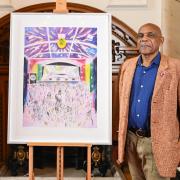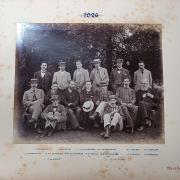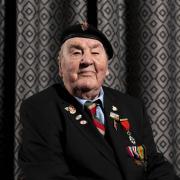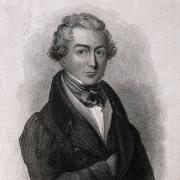Radical Liberal politician, Leonard Courtney was ahead of his time and deserves to be better known than he is. It's not often Cornish Greats uncovers someone who had connections extending to the heart of the British Establishment and the Privy Council but here is one such man
Born in Penzance on July 6, 1832, Leonard was the son of a banker, John Sampson Courtney, and Sarah Mortimer. Two of his brothers would also become eminent, John (1838-1920), who succeeded in becoming Deputy Minister of Finance in Canada, and William (1845-1913), a civil servant who was also a bibliographer and man of letters. A sister, Louise, was born in New Street, Penzance, in 1850, the youngest of the siblings, whilst the family would move to Alverton House, a Grade II Listed pile to the west of the town, where Louise would still be residing in 1885 when she married.
Educated at St John’s College, Cambridge, Leonard Courtney became a fellow in 1856 and was then called to the bar from 1858 (the legal one, not the boozy one), and from 1872-75 was Professor of Political Economy at University College London (UCL). He then spent time in India (1875-76). He displayed another of his passions when he became President of the Royal Geological Society of Cornwall between 1881-82. After one unsuccessful attempt at becoming an MP, Courtney was elected Member of Parliament for Liskeard in December 1876, being returned to the Commons as a Liberal. He was married on March 15, 1883 at St Jude’s Church, Whitechapel, to Catherine (Kate) Potter (1847-1929), a Herefordshire-born social worker and internationalist, and fellow Quaker, who he’d first met a few years earlier in 1880. She was the elder sister of Beatrice Webb (1858-1943), the economist, sociologist, feminist and social reformer, and coined the phrase ‘collective bargaining’. They’d be happily married for some 35 years until Leonard’s death in 1914 but would remain childless despite Catherine undergoing fertility treatment.

As a politician Courtney represented Cornish constituencies between 1876 and 1900 (Liskeard between 1876-85 and Bodmin after a constituency merger for the remaining period of 15 years). Liskeard, in south-east Cornwall, had seemed happy to elect, then re-elect as its MP a man who was quite radical in his beliefs for the time, an indication that the community here was surprisingly progressive during the late-18th century. He only ever held minor offices of state although he was appointed Financial Secretary to the Treasury by Gladstone (1882-84) and served as Deputy Speaker of the House of Commons (1886-93). He’d resigned as Financial Secretary when his pet proportional representation was excluded from a parliamentary reform bill of 1883 and would cross the floor to join the Conservatives in 1886 because of his then opposition to Irish Home Rule; he’d always be a conviction politician. Courtney’s days in the Commons came to an end in September 1900 when he fell out with his Conservative ‘friends’ over his attitude to the 2nd Boer War (1899-1902) where his anti-militarist tendencies saw him favouring the Boer side, and speaking out against their maltreatment, and this in a war that had stirred up a fair amount of hysteria back in the UK. Both Leonard and his wife Catherine were prominent among those favouring an early end to the war, a stance they’d also adopt, equally unpopularly, during WW1. Courtney had already swum against the tide having opposed British foreign policy from around 1908 as likely to contribute towards European war at some point or other. During the war itself he’d support the cause of conscientious objectors. All this represented another steadfast position adopted by Courtney; he’d opposed British expansion in Africa all the time he’d been in Parliament when the prevailing mood was very much contrary to this. Although he’d been against Irish Home Rule to begin with, Courtney had converted to that particular cause as he came to see it as another movement in opposition to British imperialism. A supporter of unpopular causes, Courtney was also a backer of women’s rights at a time when most of his male colleagues would have looked on askance. He was back in the Liberal Party by 1906 when he stood unsuccessfully for the Commons again, but was made a baron in the same year, becoming 1st Baron Courtney of Penwith and serving in the House of Lords until his death at which point the barony expired. His elevation to the Lords came as no great surprise; the 1906 election had seen a landslide Liberal victory.

A published author, one of Courtney’s catchy titles was ‘Direct Taxation, an Inquiry’, a tome of interest to the many. He wrote for The Times, his pamphlets and articles positioning him as one of the most talented of doctrinaire Liberals, doctrinaire implying a resolute commitment to a cause no matter the difficulty; in Courtney’s case it was proportional representation and a significant extension of local government. As far as proportional representation is concerned, we still wait more than a century after Courtney’s death so lumber on with the archaic and rather inequitable ‘First past the post’ system, well, for UK general elections anyway. Courtney did his best at the time, his visage ever determined, dominated somewhat by a substantial lower lip that made him look like he pouted in petulant displeasure. Perhaps he did.
Leonard Courtney, 1st Baron Courtney of Penwith, died in Chelsea, London, on May 11, 1918, aged 85. It was a short time before the commencement of WW1, the final spring before four years of total war. His life would be written by Liberal MP and historian George Peabody Gooch (1873-1968) and such was his celebrity he sat for more than a dozen portraits. We don’t know for sure who first coined the phrase ‘lies, damned lies, and statistics’ but Courtney is one of those in the frame and it’s quite believable he would utter something like that in a pout-ridden outburst of condemnation. He was after all a politician of ‘unbending integrity’ and was deservedly the most significant and successful Cornish politician until perhaps Truro-born David Penhaligon (1944-86), another Liberal, whose career was tragically cut short by a car accident. He left around £57,000 which I believe equates to some £3.3 million in today’s loot. He’d done well for himself as MPs didn’t even get paid back then!

CHRONOLOGY
1832 – Birth of Leonard Henry Courtney in Penzance (July 6).
1856 – Becomes a Fellow of St John’s College, Cambridge.
1872 – Professor of Political Economy at University College London.
1876 – Elected Member of Parliament for Liskeard.
1882 – Financial Secretary to the Treasury under William Ewart Gladstone.
1883 – Marries Catherine Potter, the sister of Beatrice Webb.
1886 – Crosses the floor to join the Conservatives over the Irish Home Rule issue.
1900 – Courtney’s 25-year stint in the Commons ends as he opposes the Boer War.
1906 – His final attempt to become an MP ends in failure but he’s elevated to the Lords.
1918 – Death of Leonard Courtney, 1st Baron Courtney of Penwith (May 11) aged 85.



























